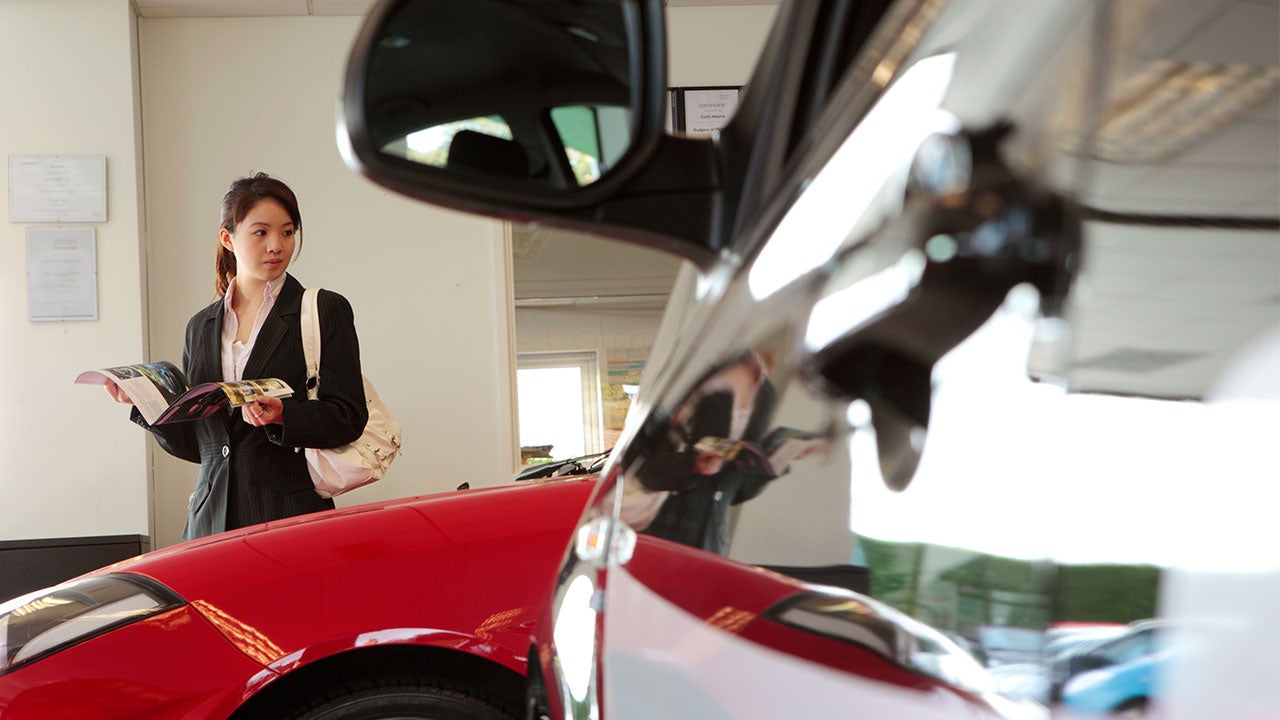How to lease a car with bad credit

Key takeaways
- Although leasing a car with bad credit is possible, it will likely mean higher rates.
- If you have bad credit, consider getting a cosigner, making a larger down payment, decreasing your debt-to-income ratio or shopping around to negotiate a better lease.
- You can also look into transferring a lease or leasing a used car for more affordable options.
For many drivers, leasing a car provides an affordable way to get behind the wheel of a new car. Leasing comes with lower monthly payments and eliminates many of the other expenses associated with car ownership — including repair costs, which the dealer will largely cover.
But to take advantage of the lower payments that come with a lease, you have to have a good enough credit profile to qualify. Leasing a car with no credit history or bad credit can make it more challenging to get approved.
Can you lease a car with bad credit?
Even those with poor credit can lease a car, but — similar to taking out an auto loan with bad credit — your rates may be less favorable than those with strong credit. Dealers give customers with good credit scores better money factors (the leasing equivalent of an interest rate). If you have too low a score, they may not lease to you at all.
According to Experian, the average credit score for people leasing new vehicles as of 2024’s fourth quarter was 752, which falls under the prime category.
However, there is no steadfast minimum credit score requirement for leasing, and more than just your credit score will be factored into your approval. Lessors also consider your current income, employment history and current debt obligations when you apply.
No credit score or a low score will not necessarily keep you from leasing. Still, you may be required to provide a larger down payment or make higher monthly payments on a lease.
Drawbacks to leasing a car with bad credit
Taking steps to improve your credit score will help you overall. That said, you can still potentially lease a vehicle before repairing your credit completely — just be aware of these potential pitfalls:
- High cost: Having a low credit score could mean you will need to do more, like make a larger down payment to qualify for a leasing agreement. Your lease offer may also include a higher money factor, resulting in higher payments that may be unaffordable.
- Possible restrictions: If you have bad credit, dealers may decide you can only lease vehicles within a given price range. And some dealerships may not work with you at all.
- No equity: When you lease a vehicle instead of buying one, you walk away with no equity at the lease’s end. This means you won’t have any trade-in or monetary value to apply to the purchase or a new lease.
How to improve your chance of lease approval
If you are set on leasing a car with bad credit, there are a few steps you can take to boost your approval odds.
1. Make a large down payment
Experts generally call making a big down payment one of the car leasing mistakes you should avoid, since if you total a leased vehicle, your insurance will reimburse the lessor instead of you.
However, in this case, it could be a smart move. For one, a big down payment shows your potential lender that you are committed to paying off your lease. Making a down payment on a lease is called capitalized cost reduction. The more money you provide in a down payment, the lower your monthly payments will be. These smaller payments may give the lender more confidence in your ability to keep up.
2. Get a loan cosigner
Another way to gain approval is by getting a cosigner, which could be a trusted relative or friend with a stronger credit history than you. A cosigner adds a layer of security for the lessor. It can also help establish credit.
The cosigner shares responsibility for the lease, and their credit will be affected if you do not pay. In addition, if you fail to make lease payments, your cosigner will need to do so.
3. Aim to lower your debt-to-income ratio
Lowering your debt-to-income ratio is also a green flag for leasing companies. Your debt-to-income ratio, or DTI, is your monthly payments divided by your monthly income.
As someone with poor credit, you want to lower this number by paying off debts, refinancing to a lower rate or increasing your income. You might also consider a debt consolidation loan. These allow you to combine multiple debts into a single payment, making them easier to manage.
Use a debt-to-income calculator to find out where you currently stand.
4. Shop around
When looking for a car lease, shop at several dealerships and leasing companies to see which has the best deal for customers with bad credit. Given that each dealership evaluates leases differently, you could receive a more favorable lease offer than you expect — and potentially at a lower rate.
Try to negotiate the terms of your lease, though you may have less leverage when you have bad credit. Consider negotiating the vehicle’s buyout price, which is the price you would pay to buy the car at the end of the lease contract. This price generally cannot be negotiated after the lease ends, so address it upfront if you think you may want to buy the car.
5. Improve your credit score
There are several ways you can improve your credit score fairly quickly:
- Report rent and utility payments: Self-reporting alternative data like these bills can help boost your score if you show steady payments.
- Pay off any debt you can: Lowering your debt-to-income ratio can help improve your score.
- Look into getting a secured credit card: These offer a small line of credit for a security deposit, which can help build credit without risking high amounts of debt.
- Request a credit limit increase: Having more credit available can lower your credit utilization ratio, boosting your score.
- Become an authorized user on someone else’s credit card: If the primary account holder has a good history of making payments, that can reflect well on an authorized user’s credit score.
- Dispute credit report errors: This can be a relatively fast way to improve credit. After you submit a dispute, the reporting bureau has 30 days to verify the item or remove it from your credit report.
Alternatives to leasing a car with bad credit
If you are not able to find a competitive leasing deal, consider these three alternatives:
- Lease transfer: A lease transfer may be an option if you cannot get a lease or a lease with favorable terms. Companies like SwapALease and LeaseTrader specialize in pairing people who want to get out of a lease with those seeking a lease. While lease takeovers still require a credit check to qualify, the terms could be more favorable without requiring a down payment.
- Lease a used car: Another option is leasing a used car. Not all dealerships offer used cars for lease, so you may have to shop around to find a dealership in your area that offers this service. If you do, note all the terms and how much you will pay during the lease. You may find a better deal by purchasing a used car.
- In-house financing: “lease here, pay here” dealers that offer in-house financing for cars they lease. The downside is that the leases often have a far higher price tag and steeper monthly payments. In addition, the lease payment terms are generally far from ideal — you may be responsible for covering car maintenance costs. The selection of cars available at lease here, pay here dealers may be older or more limited.
Bottom line
Leasing a car with bad credit typically means less favorable terms and, potentially, a steep down payment. Consider applying with a cosigner, lowering your debt-to-income ratio or putting more money down to qualify for better terms. You can also look into alternatives like lease transfers, leasing a used car, in-house financing or bad credit auto loans.
If time is on your side, take steps to improve your credit score before applying. Otherwise, shop around and try to negotiate your lease, no matter your credit score, to obtain the best deal possible.







